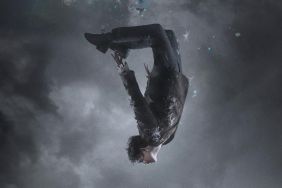Adrien Brody as Jack Starks
Keira Knightley as Jackie
Kris Kristofferson as Dr. Becker
Jennifer Jason Leigh as Dr. Lorenson
Kelly Lynch as Jean
Brad Renfro as The Stranger
Daniel Craig as Mackenzie
Jason Lewis as Cop
Jake Broder as Dr. Morgan
Jonah Lotan as Doctor K
Steven Mackintosh as Dr. Hopkins
Mackenzie Phillips as Nurse Harding
Ian Porter as Major
Tara Summers as Nina
Summary:
The Jacket’s intriguing time travel premise never gets off the ground, since it’s so bogged down with so much ridiculous psychobabble and plot holes that it’s hard to care about the characters.
Story:
It’s 1992, and Jack Starks (Adrien Brody) has returned home from the Gulf War with a head wound. Framed for the murder of a police officer, he’s put into an insane asylum where he is subjected to experimental behavioral modification involving drugs, a restraining jacket and a morgue drawer. The drugs cause hallucinations at first, but then he is mysteriously transported 15 years into the future where he learns from a young woman (Keira Knightley) that he will die in four days.
Analysis:
Time travel is always a difficult subject matter to handle properly, because it immediately requires the suspension of disbelief and often causes confusion if not done right. More than a century after HG Wells wrote “The Time Machine,” filmmakers are still trying to find new ways to incorporate time travel into other film genres, with last year seeing two unique takes in The Butterfly Effect and Primer. The Jacket uses time travel through psychiatric treatment as its kicker premise in a story that borrows quite liberally from Terry Gilliam’s 12 Monkeys and Jacob’s Ladder.
After a jarring Gulf War sequence complete with the obligatory war horrors, Jack is shot in the head in the field, before the story cuts to Vermont in winter. While walking down a road, Jack encounters a young girl named Jackie and her intoxicated mother, whose car broke down, and for whatever reason, he gives the girl his dog tags. A victim of being in the wrong place at the wrong time, Jack is accused of murder and thrown into an asylum after being diagnosed as having “Gulf War Syndrome.” As a murderer, he’s the perfect candidate for a new treatment by the cold Dr. Becker, played by Kris Kristofferson, complete with a trimmed beard.
After being put into the dark claustrophobic morgue drawer, he finds himself standing outside a restaurant where a waitress, an almost unrecognizable Keira Knightley, picks him up in hopes of helping the homeless. After snooping around, Jack discovers that he has been transported to the year 2007, and this is the girl to whom he gave his dog tags. She doesn’t believe it’s him, because he died back in 1992, shortly after his treatment began.
That’s the set-up for what could be a decent sci-fi tinged psychological thriller, but under the auspices of British video director John Maybury, it’s a very slow dialogue heavy drama that chooses to show rather than tell. Essentially, the movie ends up being a lot of talking, which wouldn’t be so bad if the performances weren’t so dry, as if they were being read off teleprompters with almost no emotion.
The one exception is Brody who adds a bit of emotion to his rather one-dimensional character. You can tell that he’s doing the best with what he has to work with but there is so little depth to his brooding character that you really don’t care much for what happens. Everything is just taken so seriously, except for one amusing moment where Jack and a fellow patient played by Daniel Craig try to stir up the other patients in a moment right out of One Flew Over the Cuckoo’s Nest. You also quickly realize that Keira Knightley isn’t nearly as sexy without that cute British accent of hers, although at least her first appearance in the film is impressive, since she’s in such a bedraggled state that she’s almost unrecognizable. Despite her intoxication, it’s hard to believe that any woman would bring an unknown homeless man into their home and then proceed to take a bath in the next room.
As far as the rest of the cast, Kris Kristofferson hasn’t improved much as an actor with age, and Jennifer Jason Leigh isn’t much better as the world’s worst psychiatrist who tries to help Jack. She also chooses to take the advice of her patient on how to treat a young autistic patient and allows him to leave the asylum at his own will. Granted this is supposed to be science fiction, but unbelievable real world aspects like this one make it harder to believe the more fantastic elements.
Trying to make sense out of time travel can often be a lesson in futility in itself, but this one expects people to accept the premise with a lot of faith. Unlike The Butterfly Effect, in which Ashton Kutcher projected his mind into his past selves, Jack’s time travel technique actually allows him to physically manifest himself fifteen years into the future with enough solidity to have a gratuitous sex scene with Knightley. (It’s best not to think about the fact that she’s still only ten years old back in 1992.)
Perhaps the premise would have worked better on television as a mixture of “Quantum Leap” and “Millennium,” with Jack using his jacket-and-drawer treatment to try to solve mysteries and help people. In this episode, he and Jackie become a less charismatic version of Mulder and Scully, as they to try to track down the asylum doctors and orderlies, who automatically assume he’s a relative of the man who died fifteen years earlier.
Just as things start to get confusing with the traveling back and forth between years-gotta love time anomalies-the movie gets to the obligatory twist. It’s not the obvious one you may expect, but it’s still a bit of a disappointment, considering how long it takes to get there. Then again, for better or worse, that ending does force you to reevaluate the premise and its implications. Of course, why Jack doesn’t just project himself into the past and stop the events that got him institutionalized in the first place is a bit of a mystery.
Maybury doesn’t let the slow pacing of the movie stop him from throwing in a bunch of flashy visual effects and camera tricks to try to make things more interesting. They don’t really work and it just doesn’t make the movie look very good. At least, the minimalistic ambient soundtrack is composed by electronica legend Brian Eno, which does a lot to help set an interesting mood.
The Bottom Line:
The Jacket offers further proof that a good premise is not enough to save a weak movie, but a great trailer can often make it look a lot better than it actually is. Sadly, it fails to deliver because we’ve seen a lot of it before, only done better.










